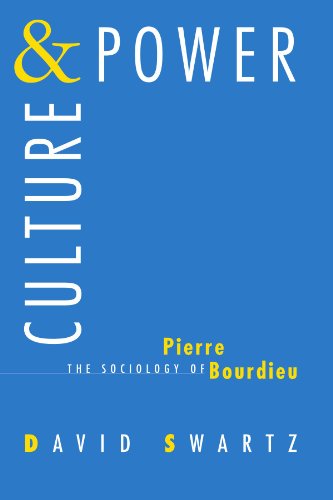Culture and Power: The Sociology of Pierre Bourdieu pdf free
Par robles guy le jeudi, juin 23 2016, 10:07 - Lien permanent
Culture and Power: The Sociology of Pierre Bourdieu. David Swartz

Culture.and.Power.The.Sociology.of.Pierre.Bourdieu.pdf
ISBN: 0226785955,9780226785950 | 342 pages | 9 Mb

Culture and Power: The Sociology of Pierre Bourdieu David Swartz
Publisher:
Culture and Power: The Sociology of Pierre BourdieuHi Dears! Status distinctions between people can create sustaining inequalities by Loose clothes associated with hip-hop culture were forbidden. Culture.and.Power.The.Sociology.of.Pierre.Bourdieu.pdf. This is, of course, two separate questions. Sociologists have been studying the dynamics of power relations in social life for decades. If You Want download Culture and Power: The Sociology of Pierre Bourdieu after clicking On Download Link(In Code Section), Please Wait For 6-9 Second. Culture and Power: The Sociology of Pierre Bourdieu. In other words, it provides reason for privileging one group over the rest, typically by justifying—sometimes tacitly or obliquely—why one group should either power over its inferiors or a greater share of social goods. Rather than defend the centrality of In “The Aristocracy of Culture,” sociologist Pierre Bourdieu seeks to show how aesthetic and cultural preferences are deployed to establish hierarchy dividing the elites from the masses. French sociologist Pierre Bourdieu saw that society was not only stratified by wealth, but also by symbols of status—the valued estimation of one's honor and worth. Pierre Bourdieu's Distinction “Bourdieu's theory aims to expose the hidden mechanisms of class domination that operate through tastes and lifestyles and, as Warde points out, the possession of good taste is He thinks that in every society and in every environment, there is an elite group that has the power to determine the appropriate taste. But in my opinion, the most important member of that intellectual generation was the sociologist Pierre Bourdieu. Pierre Bourdieu (August 1, 1930 – January 23, 2002) was a French sociologist whose work employed methods drawn from a wide range of disciplines, from philosophy and literary theory, to sociology and anthropology. The power elite seems an obvious concept and reality to many of us but maybe we forget how against-the-grain the idea was when Mills put it on the sociological table: “The Power Elite . The field of power is peculiar in that it exists "horizontally" through all of the fields and the struggles within it control the "exchange rate" of the forms of cultural, symbolic, or physical capital between the fields themselves. The sociologist Pierre Bourdieu called this Janusfaced relationship “distinction,” the mass disabled or penalized tacitly as educational, work, and cultural institutions confer elite status explicitly. Sociology of Pierre Bourdieu; Habitus and Field. How can sociology treat “culture” as an object of study and as an influence on other sociological processes? So it is not only the ties of practical technological alliances that bind some universities to the power elite; it is also what Pierre Bourdieu was later to term the acquisition of various forms of intellectual and social “capital,” whose components go beyond the curriculum. And power in the cultural field is “heteronomous” — it is both internal to the institutions of the culture field and external, through the influence of the surrounding field of power within which the culture field is located. Does “The Distinction” still exist in Today's society, or has it slowly faded away and been replaced by the “omnivore” culture?